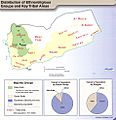Saudi-led intervention in the Yemeni civil war facts for kids
On March 26, 2015, Saudi Arabia and a group of nine other countries from West Asia and North Africa started a military action in Yemen. They did this because Yemen's president, Abdrabbuh Mansur Hadi, asked for help. He had been forced out of the capital city, Sanaa, in September 2014 by a group called the Houthis during the Yemeni Civil War. The United Nations tried to help the different groups share power, but their efforts failed. This led to more fighting between the government, Houthi rebels, and other armed groups. President Hadi had to flee to Saudi Arabia just before the military action began.
Contents
What Happened in Yemen?
The first month of this action was called Operation Decisive Storm. During this time, the Saudi-led group used airstrikes against the Houthi rebels. They also created a full blockade around Yemen. This meant that it was very hard for goods to get into or out of the country.
What Were the Main Operations?
On April 22, the Saudi-led group said they had reached their first goals. They then announced a new phase called Operation Restoring Hope. This new plan would include political talks, diplomatic efforts, and continued military action. Their goal was to stop the Houthi groups from moving around or doing anything inside Yemen. Later, ground forces were sent into Yemen. These forces fought against both Houthi fighters and those who supported Hadi's old president, Ali Abdullah Saleh. Many people see this conflict as part of a bigger struggle between Saudi Arabia and Iran, known as the Saudi-Iran proxy conflict. This is because Iran supported the Houthi groups.
Who Was Involved?
Several countries joined the Saudi-led group. Egypt, Morocco, Jordan, Sudan, and the United Arab Emirates sent both air and ground forces. Kuwait, Qatar, Bahrain, and a company called Constellis also led some ground operations. Countries like Djibouti, Eritrea, and Somalia allowed the group to use their airspace, waters, and military bases.
International Support and Help
At different times, countries like the United States, the United Kingdom, France, Germany, and Canada supported this action. The U.S. helped by sharing information and providing supplies. For example, they helped refuel planes in the air and rescued pilots whose planes had been shot down. They also sold weapons faster to the countries in the group. The U.S. also continued to carry out drone strikes against AQAP, a different armed group. In 2016, it was confirmed that American and British military officials gave advice and training for the Saudi-led airstrikes in Yemen.
How Did the Conflict Affect People?
The military action has been criticized by many countries around the world. This is because many innocent people were harmed, and important buildings and services were destroyed. It also made Yemen's humanitarian crisis much worse. A humanitarian crisis means that people do not have enough food, water, or medical care. Some experts also questioned if the action followed international laws.
Working Towards Peace
By 2019, the fighting was described as a "military stalemate." This means neither side was winning. The next year, Saudi Arabia announced its first ceasefire, meaning they would stop fighting for a while. On March 29, 2022, the Saudi-led group said they would stop all fighting in Yemen. This was to help with political talks and peace efforts. Houthi and Saudi officials then started peace talks with Oman helping them. The United Nations also helped with these talks. By April 2023, most rules on commercial goods entering Yemen were lifted. As of April 2024, the main fighting has mostly stopped. However, talks are still ongoing because of new problems. These problems include Houthi attacks on ships in the Red Sea since October 2023.
Images for kids
-
King Salman of Saudi Arabia and Saudi Foreign Minister Adel al-Jubeir meet with U.S. Secretary of State John Kerry in September 2015.
-
Saudi Arabia's UK-supplied Eurofighter Typhoons are playing a central role in Saudi-led bombing campaign in Yemen.
-
Yemen's former president Ali Abdullah Saleh was initially allied with Houthis, until they assassinated him on accounts of treason.
-
Yemen's President Abdrabbuh Mansur Hadi in Riyadh, Saudi Arabia, 7 May 2015
-
Protesters against the US-backed Saudi-led war on Yemen were led away and handcuffed by New York police outside the US mission to the UN on 11 December 2017.
 | Jewel Prestage |
 | Ella Baker |
 | Fannie Lou Hamer |












